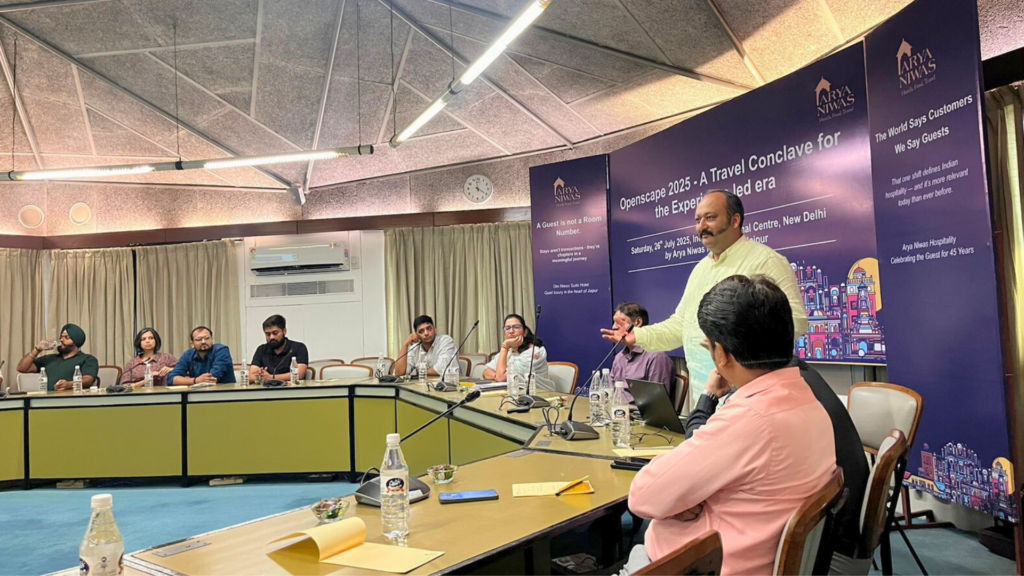AI in Travel
The great travel reboot: Generative AI’s role in ending the planning chaos | nasscom

The great travel reboot: Generative AI’s role in ending the planning chaos
Written by Sankar Subramaniam, Global Travel Industry Research Lead, Accenture
A few weeks ago, I tried to plan a short getaway. I opened my laptop and suddenly found myself swimming in tabs: one for flights, another for hotels, a third for experiences, and a few more for blogs and reviews. After two hours, I gave up. It felt too complicated, too scattered.
It turns out this is a common problem. According to Accenture report “The travel industry’s new trip: Reinventing the traveler experience with generative AI”, 68 percent of people use up to ten different websites to plan a single trip. No wonder most travelers describe the process as time-consuming and stressful.
Travel should be inspiring. Instead, it’s exhausting: Most of us enjoy the idea of travel. Social media constantly fuels our wanderlust. In fact, 71 percent of people say travel inspiration comes from digital content like blogs, social posts, and influencer videos. But once that spark of inspiration hits, the tools to turn it into reality often fall short.
66 percent of travelers are unhappy with their current options for planning a trip. More than half say apps and websites are hard to use, and many simply give up before they book. Travel today involves too many steps, too much decision-making, and not enough support.
What travelers want: one platform, fewer steps: Accenture asked travelers what they really want from the experience. Their answers were clear and practical. They want:
- One-click booking
- Smart, personal recommendations
- Natural-language search, just like texting a friend
- Simple cancellation options
- Live support if something goes wrong
- Real-time updates and travel tips
- Itinerary planning that feels effortless
In short, travelers want a digital travel assistant that knows them well and supports them from the moment inspiration strikes to the moment they return home.
How Generative AI can solve the problem: This is where generative AI becomes a powerful tool. It can help simplify and personalize every stage of the travel journey.
- Inspiration: Many people struggle to decide where to go. There is too much content, too many choices. Generative AI can take your preferences and suggest tailored options. It can chat with you, learn what you like, and inspire you with ideas that fit your budget, timing, and interests.
- Planning: Planning often requires spreadsheets, apps, and hours of comparing. AI can do the heavy lifting. It can recommend the best times to travel, bundle services, and help friends or family collaborate on a shared trip. 97 percent of travelers say they would prefer a single superapp to manage all parts of their journey.
- Booking: Booking is where most people get stuck. Flights, hotels, rental cars, insurance – all feels disconnected. 64 percent of travelers want bundled booking options, but most platforms don’t offer that. Generative AI can pull it all together in one flow, applying loyalty points, syncing with calendars, and offering the best routes.
- During the trip: Once you’re traveling, things often change. Delays happen. Plans shift. AI can support you with real-time updates, translation tools, dining suggestions, or alerts about weather and safety. It can also help track expenses and share updates with loved ones.
- After the trip: Post-trip, AI can compile memories, organize photos, summarize spending, and suggest your next destination based on what you enjoyed. This turns the travel cycle into a full loop.
This isn’t the future. It’s already happening: Some travel companies are already using generative AI to build these experiences: Saudia Airlines has introduced a digital assistant that helps travelers plan entire trips, from flights to restaurants. Soon, it will support voice and multiple payment options. Such examples show that change is coming fast.
Travelers are ready for it: People are open to these changes. The report shows:
- 89 percent are interested in subscription-based travel platforms that offer curated plans and deals.
- More than half would use a voice-based AI assistant to help with travel decisions.
The demand is clear. The technology is here. Now it’s up to travel companies to build the systems that bring it all together.
But travel brands still face challenges: Accenture surveyed 313 senior travel executives. Most of them agree that generative AI can reduce costs, improve customer service, and drive growth. But only 17 percent have scaled AI across their businesses.
Why the gap? There are a few big reasons:
- Poor data quality or fragmented systems
- Lack of AI governance or strategy
- Skills gaps across the workforce
- Unclear business cases for pilots
To get ahead, travel companies need to move quickly and build the right foundation.
There are four key steps to get it right
- Look across the entire journey: Don’t apply AI only in one area. Use it across the full value chain—from marketing and inspiration to post-trip loyalty programs.
- Fix the data: Great AI needs great data. This means investing in cloud platforms, secure data sharing, and real-time insights.
- Build trust: AI must be responsible. Travelers want transparency, privacy, and fairness in how their data is used.
- Empower employees: Train staff to work with AI. Create new roles like digital concierge designers or experience curators. The human touch still matters.
With this in mind, let’s envision what the ideal trip could look like: let’s imagine a traveler planning a wellness getaway.
- Six months out, an AI app suggests a yoga retreat in Portugal. It knows your calendar, your interests, and your budget.
- A few weeks later, you tell it you want something quieter. It reworks the plan, includes boutique hotels, and checks availability.
- You book the trip in one click, using loyalty points and choosing travel insurance that matches your needs.
- While traveling, the app tracks your flight, rebooks your transfer due to a delay, and gives you food recommendations nearby.
- After your return, it sends you an album of photos, shows what you spent, and suggests a hiking trip in spring.
This is what travel could feel like. Natural. Simple. Personalized.
It’s time for travel to feel effortless: Travel is booming again. The world is moving, and travelers are ready for something better. The tools exist. The consumer need is urgent. The opportunity is massive.
For too long, travel planning has felt like work. It doesn’t have to. Generative AI offers a new way forward—a chance to make travel feel magical again. This isn’t about replacing people. It’s about enhancing experiences. It’s about giving travelers what they really want: confidence, clarity, and joy.
We’ve all struggled with clunky apps and endless tabs. The next phase of travel will feel different. It will feel human. And it will start with one smart conversation at a time.
To learn more about how generative AI can redefine customer experiences and unlock new value for organizations, read the report: The travel industry’s new trip: Reinventing the traveler experience with generative AI
AI in Travel
With focus on AI, sustainable travel Arya Niwas organises Openscapes 2025 in New Delhi

The opportunities and challenges that issues like artificial intelligence, sustainability and experiential travel pose to the tourism industry in India and overseas were highlighted at Openscapes 2025, a travel conclave in New Delhi on Saturday.
Organised by Arya Niwas, a hospitality group based in Jaipur, the conclave served as a participative platform to explore transformative ideas for the tourism sector, addressing pressing issues such as sustainability, experiential curation, the role of artificial intelligence (AI), and the integration of responsible practices into the travel experience.
Drawing stakeholders from across India’s hospitality industry, the conclave was organised with the core theme of Projecting India and Rajasthan with a stronger, more meaningful narrative.
“This is the first conclave. It is called Openscapes. We hope that we will be having more such dialogue-based conclaves on travel. There is a need for us to behave as one in the travel industry and to move forward together because the ultimate aim is to serve the guests and make the guests win,” Pooja Bansal, Owner and General Manager, Arya Niwas, told India & You on the sidelines of the event.
The urgency of the issues raised at the meeting was underscored by leading tour operators, who highlighted that Indian tourism, particularly in recent years, “has not been sustainable and things have gone really, really bad.”
The conclave drew stakeholders from across India’s hospitality industry
“When we talk about sustainability with experiential tourism, the experience at the grassroot level, meeting local people with a bit of sustainability, offers eye-opening encounters. Yet, there are challenges,” Navneet Arora, Managing Director, VINString Holidays, a travel agency in New Delhi, told India & You.
The meeting illustrated both obstacles and achievements in rural and urban experiential tourism. Operators cited instances where visitors’ immersion in heritage neighbourhoods and private homes fostered mutual pride among locals and tourists. However, they also warned against approaches that leave rural residents feeling like “monkeys in the zoo,” underscoring the necessity of responsible, respectful interaction, something now addressed by ensuring a share of tour proceeds benefit the communities involved. Sustainability, participants argued, extends well beyond eco-friendly rhetoric.
The conclave highlighted innovative tour formats, slow tourism, creative workshops and direct engagement with artisans, as pathways for deeper, more rewarding guest experiences.
“I think that is the call for the future, because automation has to come in. If we are not doing automation today, we are backwards. AI is important. The event opens up eyes for a lot of people. Difficult, but yes, AI and sustainability are important and doable,” Arora added.
“The interpretation of sustainability has become very cliché. This was a session to break that,” said Bansal.
Participants at the Openscapes 2025 called for a sustained dialogue, with suggestions for sector-wide conventions and targetted sessions on marketing and AI and more collaborative initiatives.
AI in Travel
Sabre Corporation’s Strategic Partnership with Christopherson Business Travel and Its Implications for Undervalued Cloud and AI Stocks

Sabre Corporation (NASDAQ: SABR) has long been a cornerstone of the global travel technology sector, but its recent strategic partnership with Christopherson Business Travel marks a pivotal evolution. By leveraging its AI-driven platform and cloud-native infrastructure, Sabre is not only modernizing corporate travel management but also positioning itself as a catalyst for growth in the undervalued travel tech sector. For investors, this collaboration offers a compelling case study in how AI and cloud innovation can unlock long-term value in a niche yet resilient market.
A Strategic Alliance for the Future of Corporate Travel
On July 17, 2025, Sabre announced a multi-year agreement to become Christopherson Business Travel’s primary technology partner. This partnership is more than a transactional arrangement—it’s a strategic alignment of two companies aiming to redefine corporate travel through automation, real-time data, and personalized service. Sabre’s AI-powered tools, including Sabre Red 360, Trip Proposal, and Market Intelligence, will streamline operations for Christopherson, enabling faster decision-making and enhanced client offerings.
The integration of Sabre’s cloud-native infrastructure into Christopherson’s proprietary Andavo platform is particularly noteworthy. This move allows for real-time orchestration of multi-source content (air, hotel, rail, ground) and seamless API-driven integrations, reducing manual effort and improving scalability. As Chad Maughan, CTO of Christopherson, noted, Sabre’s architecture provides the operational flexibility needed to adapt to evolving client demands—a critical advantage in the post-pandemic corporate travel landscape.
Sabre’s Financial Resilience and AI-Driven Growth
Sabre’s financial performance in 2024 underscores its transition from a turnaround story to a growth-oriented entity. Revenue increased to $3 billion, with adjusted EBITDA rising to $517 million—a 54% year-over-year improvement. While IT Solutions revenue dipped due to de-migrations, the Travel Solutions and Distribution segments grew by 4% and 6%, respectively, driven by demand for Sabre’s AI-powered tools.
The company’s market cap of $1.222 billion pales in comparison to AI/cloud giants like Databricks ($62 billion) or Snowflake ($43.6 billion), but this undervaluation reflects Sabre’s niche focus. Its strategic investments in Sabre Mosaic—a modular platform combining AI, cloud, and traditional agent workflows—position it to capture a larger share of the corporate travel market, which is projected to grow as businesses prioritize cost optimization and efficiency.
The AI/Cloud Travel Tech Opportunity
The broader travel tech sector is undergoing a transformation fueled by generative AI. According to Skift Research, AI-driven tools could create a $28 billion+ opportunity for the industry, with applications in personalized itineraries, dynamic pricing, and automated customer service. Sabre’s Automated Exchanges & Refunds and Agency Retailer solutions are already streamlining post-booking processes, reducing manual intervention by up to 70%.
However, Sabre is not alone in the race to monetize AI in travel. Competitors like C3.ai (NYSE: AI), Marvell Technology (NASDAQ: MRVL), and DigitalOcean (DOCN) are also leveraging cloud and AI to drive growth. C3.ai’s predictive analytics tools, for instance, have secured government contracts worth $450 million, while Marvell’s AI-optimized chips are powering data centers for hyperscale providers. Yet, Sabre’s deep vertical integration into travel-specific workflows gives it a unique edge in the corporate travel niche.
Why Sabre Is an Undervalued Investment
Despite its strategic advantages, Sabre remains overlooked by many investors. Its current price-to-earnings ratio (P/E) of 8.5 is significantly lower than the industry average of 18.5, and its hedge fund ownership (11.2%) suggests growing confidence in its AI-driven roadmap. The partnership with Christopherson is a validation of Sabre’s value proposition: it enables the company to scale its AI/Cloud offerings without overhauling existing systems, a critical factor for travel agencies seeking cost-effective modernization.
For investors, the key question is whether Sabre can replicate its success in other verticals. The company’s PowerSuite Cloud platform, which automates operations and integrates NDC content, is already gaining traction among mid-sized travel agencies. If Sabre can expand its footprint in the corporate and leisure travel markets, its revenue could outpace the 10% growth projected by analysts.
Conclusion: A Strategic Bet on AI-Driven Travel
Sabre’s partnership with Christopherson Business Travel is a microcosm of the broader shift toward AI and cloud-native solutions in travel technology. While the company may lack the valuation of tech giants like Microsoft or Google, its focus on vertical-specific innovation and operational efficiency makes it a compelling play for investors seeking exposure to the travel sector’s AI revolution.
For those considering a diversified portfolio, Sabre offers a unique blend of undervaluation and growth potential. However, it should be viewed as a complementary holding to broader AI/cloud stocks like C3.ai or Marvell, rather than a standalone bet. As the travel industry continues to embrace AI-driven automation, Sabre’s ability to deliver scalable, client-centric solutions will likely drive long-term value for both its partners and shareholders.
AI in Travel
AI Travel Tricks: Watch Out for the Road to Nowhere – Herald/Review Media

AI Travel Tricks: Watch Out for the Road to Nowhere Herald/Review Media
Source link
-

 Brand Stories6 days ago
Brand Stories6 days agoBloom Hotels: A Modern Vision of Hospitality Redefining Travel
-

 Brand Stories1 day ago
Brand Stories1 day agoCheQin.ai sets a new standard for hotel booking with its AI capabilities: empowering travellers to bargain, choose the best, and book with clarity.
-

 Destinations & Things To Do7 days ago
Destinations & Things To Do7 days agoUntouched Destinations: Stunning Hidden Gems You Must Visit
-

 AI in Travel7 days ago
AI in Travel7 days agoAI Travel Revolution: Must-Have Guide to the Best Experience
-

 Brand Stories3 weeks ago
Brand Stories3 weeks agoVoice AI Startup ElevenLabs Plans to Add Hubs Around the World
-

 Brand Stories2 weeks ago
Brand Stories2 weeks agoHow Elon Musk’s rogue Grok chatbot became a cautionary AI tale
-

 Destinations & Things To Do1 day ago
Destinations & Things To Do1 day agoThis Hidden Beach in India Glows at Night-But Only in One Secret Season
-

 Asia Travel Pulse3 weeks ago
Asia Travel Pulse3 weeks agoLooking For Adventure In Asia? Here Are 7 Epic Destinations You Need To Experience At Least Once – Zee News
-

 AI in Travel3 weeks ago
AI in Travel3 weeks ago‘Will AI take my job?’ A trip to a Beijing fortune-telling bar to see what lies ahead | China
-

 Brand Stories3 weeks ago
Brand Stories3 weeks agoChatGPT — the last of the great romantics



You must be logged in to post a comment Login